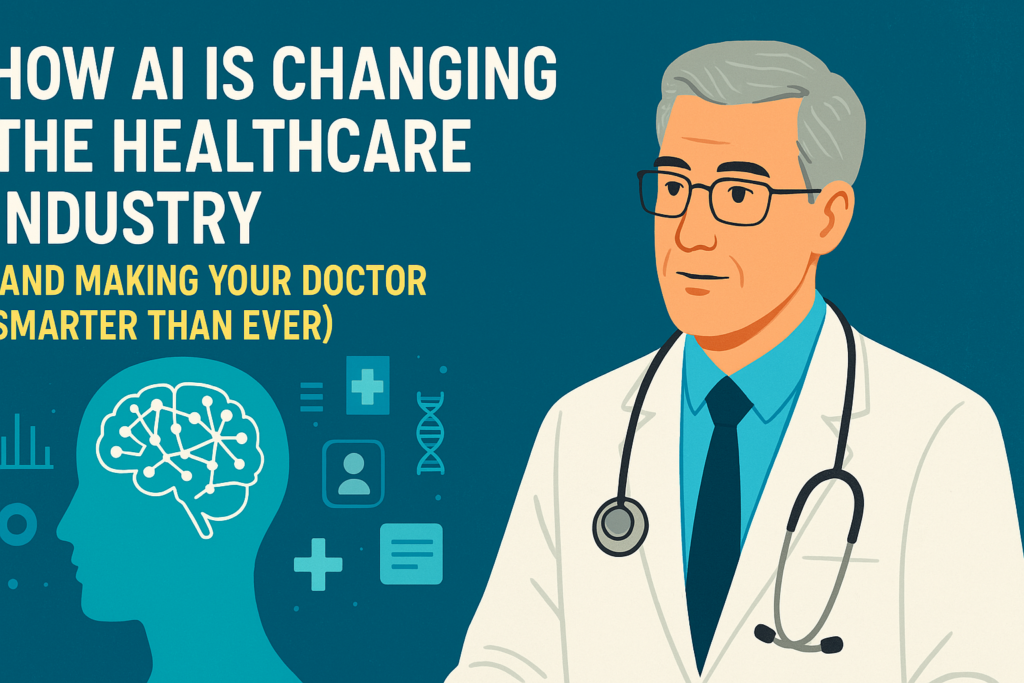Let’s be honest—no one loves spending time in hospitals. The long waits, the paperwork, the “just a little pinch” lies. But what if a quiet revolution was happening behind those sliding doors? One led not by more humans in lab coats but by artificial intelligence. Yep, AI. The same tech behind your favorite chatbot or Netflix recommendation is now scrubbing into the world of healthcare—and it’s doing more than just playing assistant.
Welcome to the future of medicine, where AI in healthcare is not just a buzzword, it’s a game-changer.
AI in Medicine: Not Just a Sci-Fi Plot Anymore
Remember when doctors had to rely on their experience, instinct, and a massive pile of patient files to make decisions? Those days are fading fast.
AI in medicine is giving doctors superpowers—minus the cape. Algorithms can now sift through mountains of data (we’re talking thousands of cases) in seconds. Want to detect early signs of Alzheimer’s? There’s an AI for that. Trying to figure out which treatment plan has the highest success rate? AI’s got the stats.
This isn’t about replacing doctors—it’s about giving them the best tools in the box. Think of AI as the brainy sidekick that never sleeps.
AI Diagnostics: Your Second (Smarter) Opinion
Ever left a doctor’s office more confused than when you walked in? You’re not alone. Diagnosing an illness can be like solving a puzzle with a few missing pieces. That’s where AI diagnostics come in hot.
Using machine learning and pattern recognition, AI can analyze test results, images, and symptoms to flag potential issues a human eye might miss. In fact, studies have shown that AI can sometimes diagnose conditions like breast cancer and diabetic retinopathy more accurately than traditional methods.
It’s like having a Sherlock Holmes in the exam room—one who’s read every medical journal, remembers every case, and doesn’t need coffee to focus.
Smart Hospitals: The Brainy Buildings of the Future
You’ve heard of smart homes—now meet smart hospitals. These are healthcare facilities where AI is woven into everything, from patient monitoring to scheduling surgery.
Imagine this: You walk into a hospital, and an AI-powered system already knows your medical history, predicts your needs, and alerts staff before things go south. Sensors track your vitals in real-time. Robots deliver meds. AI manages inventory so no one’s scrambling for gloves in the middle of the night.
And yes, this is already happening in places like South Korea, Germany, and even parts of the U.S.
In a smart hospital, everything is faster, smoother, and a whole lot less chaotic. And let’s be real—any tech that cuts down the waiting room time deserves a standing ovation.
AI Won’t Replace Your Doctor—But It Will Make Them a Lot Better
There’s a lot of talk about AI replacing jobs. In healthcare, it’s a different story. AI isn’t here to boot your doctor out of the room; it’s here to make them a rockstar.
By handling the repetitive, data-heavy stuff—like chart reviews, lab result comparisons, and risk calculations—AI frees up time for doctors to focus on what they do best: treating people.
Plus, it helps reduce human error. No one’s perfect, and a second opinion from a tireless machine? Not such a bad idea when your health’s on the line.
So, What’s Next?
We’re just scratching the surface. AI in healthcare is still growing, learning, adapting. As it gets better, so will our access to faster diagnoses, personalized treatment plans, and more efficient hospitals.
But even with all this tech, one thing stays the same: the human connection. AI might analyze your x-rays, but it’s still a real person who will look you in the eye, explain what’s going on, and help you heal.
So next time you’re in a hospital, and things feel just a bit more efficient than usual, thank the nurses, thank the doctors—and maybe give a little nod to the algorithm quietly working behind the scenes.
Bottom line? AI is changing the healthcare industry in big, bold ways. From AI in medicine to AI diagnostics and even smart hospitals, the future looks faster, smarter, and (thankfully) a lot less paper-clippy.
And honestly, we could all use a little more smart in our sick days.


